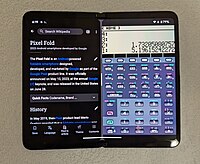
Photo from wikipedia
This paper presents a novel deep learning-aided scheme dubbed $PR\rho $ -net for improving the bit error rate (BER) of the Time Reversal (TR) Ultra-Wideband (UWB) Multiple Input Multiple Output… Click to show full abstract
This paper presents a novel deep learning-aided scheme dubbed $PR\rho $ -net for improving the bit error rate (BER) of the Time Reversal (TR) Ultra-Wideband (UWB) Multiple Input Multiple Output (MIMO) system with imperfect Channel State Information (CSI). The designed system employs Frequency Division Duplexing (FDD) with explicit feedback in a scenario where the CSI is subject to estimation and quantization errors. Imperfect CSI causes a drastic increase in BER of the FDD-based TR-UWB MIMO system, and we tackle this problem by proposing a novel neural network-aided design for the conventional precoder at the transmitter and equalizer at the receiver. A closed-form expression for the initial estimation of the channel correlation is derived by utilizing transmitted data in time-varying channel conditions modeled as a Markov process. Subsequently, a neural network-aided design is proposed to improve the initial estimate of channel correlation. An adaptive pilot transmission strategy for a more efficient data transmission is proposed that uses channel correlation information. The theoretical analysis of the model under the Gaussian assumptions is presented, and the results agree with the Monte-Carlo simulations. The simulation results indicate high performance gains when the suggested neural networks are used to combat the effect of channel imperfections.
Journal Title: IEEE Transactions on Communications
Year Published: 2022
Link to full text (if available)
Share on Social Media: Sign Up to like & get
recommendations!